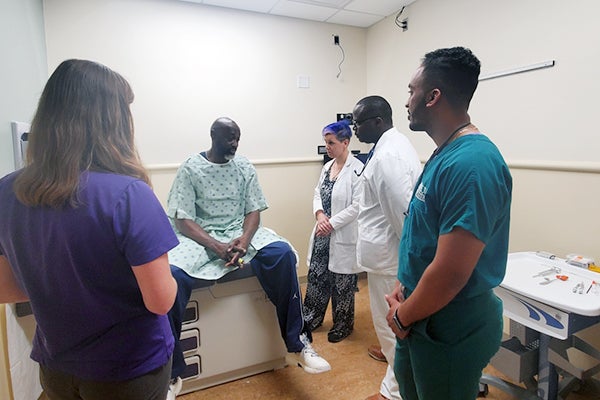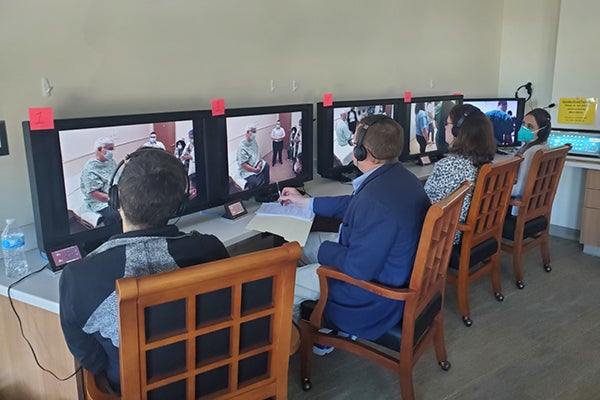Health sciences students gain valuable experience from interprofessional workshop
Students from every college and school on East Carolina University’s Health Sciences Campus participated in the Truist Developing Future Interprofessional Healthcare Leaders workshop earlier this month at Eastern Area Health Education Center (AHEC).
The workshop was made possible through a $10,000 grant from the Truist Center for Leadership Development and is eligible to be renewed for future years. The event was a partnership between Eastern AHEC and ECU.

Students from colleges and schools on ECU’s Health Sciences Campus interact with a standardized patient during the Truist Developing Future Interprofessional Healthcare Leaders workshop. (Photos by Spaine Stephens)
“During the past decade, clinical care has rapidly changed to be more team-based across professions,” said Dr. Stephen Charles, interim assistant vice chancellor for Interprofessional collaboration for health sciences and assistant dean of medical education outcomes and assessment. “In order to provide quality and cost-effective care, health professionals must be ready to lead and collaborate in interprofessional teams. This workshop provides opportunities for students a psychologically safe environment to learn multiple communication and teamwork strategies and apply these strategies in a simulated environment.”
The two dozen students were placed in teams that included representation from the Brody School of Medicine, School of Dental Medicine, College of Allied Health Sciences and the College of Nursing. They were assigned two different patient cases, which the teams studied and discussed their individual roles in the patient’s care. Then, the teams provided simulated care to two standardized patients — members of the community who act as patients to provide students opportunities to learn without risk to actual patients through in-person simulations and interactions.
During the simulated provider-patient interactions, health sciences faculty observed from another room via live feed. Following their conversations and care of the patient, the teams debriefed and discussed how their roles contributed to the patient’s overall care.
A group of students received details about their patient before heading into the clinic room. They discussed how each would contribute to the patient’s care, including dental student Quain Morales, who would examine the patient’s head and neck.
Dr. Taneet Ghuman, director of interprofessional education for the School of Dental Medicine, helped lead the workshop, observing the team and providing guidance as needed. During a patient panel during the morning workshop session, a patient mentioned the importance of having a dentist involved in overall health care.
“She said, ‘Thank goodness someone from the dental area is in the room,’” Ghuman said, highlighting the way each health care discipline can provide unique insight into patient cases and care.
The workshop also gave students a chance to learn more about other health sciences areas and how other students on campus learn. Physical therapy student Heather Hubeli and Morales talked between patient care sessions and discussed the differences in their academic calendars and student organizations they didn’t know were on campus.
Hubeli said she enjoyed simulation events because they helped students build confidence with each interaction and allowed students to get to know how other members of the health care team contribute.

Faculty from across the ECU Health Sciences Campus observe and evaluate students as they interact with standardized patients during an interprofessional simulation exercise.
Blair Savoca, student services director for Eastern AHEC, said the workshop helped prepare students for an evolving health care field.
“The interprofessional experience they get today is unique and will help transform health care and allow them to provide the best quality patient care,” she said. “They have been able to collaborate with each other and with faculty they otherwise wouldn’t have exposure to.”
Charles said the faculty who helped facilitate the workshop are experts in their fields and how they fit into the overall provision of care for patients.
“The faculty here today really care about students and patients,” Charles said.
For Timothy Harris, serving as a standardized patient is one of the most rewarding jobs he has ever had. He spent his Saturday at the workshop interacting with students as they learned to work with each other.
“It’s been the most interesting, value-added job that I’ve held, and I thoroughly enjoy it,” Harris said. “I love portraying the patient; it’s a great way that I can give back to the community.”
Charles said that students enjoyed learning what their colleagues do and how their roles mesh in patient care.
“They particularly mentioned learning roles and responsibilities of the different professions. They asked for more of this content in the required curriculum,” he said. “The students’ enthusiasm for this content will provide momentum for faculty members to think of other ways to incorporate this content into core content.”
The Health Sciences Campus’s Interprofessional Education Taskforce is working on expanding the project and considering other curricular initiatives that provide students valuable collaborative experiences.
“During the planning process, the committee built relationships based on trust, developed a common language/definitions and developed an understanding of the strengths each team member brings to the committee,” Charles said. “The success of this workshop relied on team communication and teamwork skills. The interprofessional education team demonstrated exactly what we want our students to learn — that we are better together.”